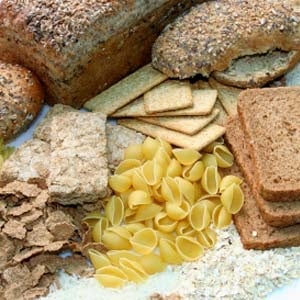
The basics
The most important thing to remember about carbohydrates and strenuous exercise is that carbohydrates are the primary source of fuel for muscles that work hard. No other macronutrient will provide you with such readily available or ‘instant’ energy.
Proteins and fats require much more complicated metabolic processing to become available as energy for physical performance and it takes much longer for amino acids or fatty acids to be released as fuel. In addition, using protein stores as a source of fuel will cause loss of lean body mass (muscles), which is not what sportsmen/women want to achieve.
Glycogen
Carbohydrates are stored in our bodies in the form of glycogen. Under normal circumstances humans are capable of storing approximately 80-100 g of glycogen in the liver and 300-400g in muscles. You will note how small our carbohydrate stores are compared to the large fat stores in the human body.
During most athletic events, this stored energy is used up relatively rapidly and long before most longer-lasting sporting activities are over.
Once glycogen is used up and not replaced by carbohydrate intake, the athlete’s performance will slow down, and he/she will become tired, lose concentration, and eventually succumb to exhaustion.
A glycogen-depleted athlete needs readily available energy to provide fuel for his exertions and to keep his blood glucose from dropping down to dangerously low levels. Such readily available energy can be obtained from carbohydrates with a high glycaemic index (GI), which can be used in the form of energy drinks and/or high-carbohydrate snacks during the event.
To replenish glycogen stores in the liver and muscles after exertion, sportsmen/women need to eat high-carbohydrate foods, a process known as carbo-loading.
How much carbohydrate?
It is evident that athletes need carbohydrate as a source of energy and for glycogen replacement before, during and after events. But how much carbohydrate does this amount to?
A large number of research studies indicate that athletes competing in different categories require the following amounts of carbohydrate:
- Highly active athletes who participate in ‘acute events’ that require maximum glycogen storage, post-exercise recovery or carbo-loading before an event:
7-10 g of carbohydrate per kg of body weight per day
(This requirement can increase up to 12 or more grams of carbohydrate per kg body weight per day if the athlete is taking part in extreme exercise, e.g. four to five hours of moderate or high intensity exercise daily such as cyclists participating in the Tour de France or marathon runners); - Athletes participating in low intensity exercise of less than one hour a day:
5-7 g of carbohydrate per kg of body weight per day
(Anyone participating in moderate intensity exercise, including non-athletes who train hard at the gym every second day, or participate in moderately strenuous recreational sport, athletes who take part in events lasting about one hour and with relatively long breaks in between, and athletes such as body builders, who expend exercise in a sustained way).
How much carbohydrate do you need?
To calculate how much carbohydrate you need, do the following:
a) Select an exercise category:
Decide which of the above-mentioned categories apply to your exercise intensity. For example, if you are a marathon runner, you would require between 7 and 10 g of carbohydrate per kg per day
b) Calculate daily carbohydrate requirement:
Multiply your daily carbohydrate requirement with your weight in kg, for example if you weigh 70 kg:
70 x (7-10) = 490 to 700 g of carbohydrate per day.
A 70 kg marathon runner who is exercising at top intensity for many hours a day and who requires glycogen replenishment and carbo-loading, would need to eat between 490 and 700 g of carbohydrate a day.
This is a very large amount of carbohydrate to obtain from food and such an athlete would have to use high-carbohydrate drinks and snacks to supplement his food intake.
The recommendations given above are generalised and simplified, so if in doubt, consult a clinical dietician to calculate your precise carbohydrate needs.
Carbohydrate foods
The following foods are good sources of carbohydrates:
All breakfast cereals, all porridges, all breads, buns, crackers, all types of pasta, samp or maize grits, sweet corn, fruit juice, dried fruit, root vegetables (potatoes, sweet potatoes, corn on the cob, carrots, beetroot, parsnips, turnips), sugar, honey, jam, boiled sweets, jelly babies, sweetened cold drinks, certain fruits such as apples and bananas (these fruits contain more carbohydrate than strawberries for example which have a high water content), specially formulated high-carbohydrate sports drinks, snacks and powders.
– (Dr I.V. van Heerden, registered dietician)




 Publications
Publications
 Partners
Partners














